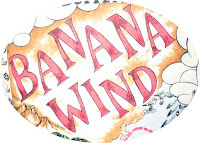 Occasionally when we go to town on Friday to shop for our groceries, we run into the "outdoor" butcher.
Occasionally when we go to town on Friday to shop for our groceries, we run into the "outdoor" butcher.The first time I came upon a scene such as the one pictured, I was totally shocked! Surely they could not be butchering this cow for resale to humans! I was quite certain that the table upon which the hacking was taking place had not been thoroughly cleaned and/or inspected by any organization protecting the public from unsafe meat handling practices! Plus, this was all done in the out-of-doors, flies included.
But, this is something that goes on all over Honduras, not just on Guanaja. On the island,  however, the machete is the knife of choice for butchering. I don't know what is used on the mainland, but there is no finesse in the cutting up of meat here. Because of the use of the machete, any choice cuts one would come to expect from a side of beef, are non-existant. Beef here, as on the mainland, is not aged nor butchered in refrigerated conditions. The cows are not grain-fed and graze on whatever is handy on the island. This tends to produce a tough, stringy, strong tasting meat which can only be cooked to tenderness by using a pressure cooker.
however, the machete is the knife of choice for butchering. I don't know what is used on the mainland, but there is no finesse in the cutting up of meat here. Because of the use of the machete, any choice cuts one would come to expect from a side of beef, are non-existant. Beef here, as on the mainland, is not aged nor butchered in refrigerated conditions. The cows are not grain-fed and graze on whatever is handy on the island. This tends to produce a tough, stringy, strong tasting meat which can only be cooked to tenderness by using a pressure cooker.
 however, the machete is the knife of choice for butchering. I don't know what is used on the mainland, but there is no finesse in the cutting up of meat here. Because of the use of the machete, any choice cuts one would come to expect from a side of beef, are non-existant. Beef here, as on the mainland, is not aged nor butchered in refrigerated conditions. The cows are not grain-fed and graze on whatever is handy on the island. This tends to produce a tough, stringy, strong tasting meat which can only be cooked to tenderness by using a pressure cooker.
however, the machete is the knife of choice for butchering. I don't know what is used on the mainland, but there is no finesse in the cutting up of meat here. Because of the use of the machete, any choice cuts one would come to expect from a side of beef, are non-existant. Beef here, as on the mainland, is not aged nor butchered in refrigerated conditions. The cows are not grain-fed and graze on whatever is handy on the island. This tends to produce a tough, stringy, strong tasting meat which can only be cooked to tenderness by using a pressure cooker.I never buy beef from these "outdoor" markets. The little beef I do buy is generally hamburger from a local market, wrapped in cellophane on a styrofoam tray. The hamburger here has very little fat, if any, and one must add oil to the mix tossing in a few bread crumbs to help keep the patty together.
 Usually the meat butchered in the outdoor markets is bought up quickly by the locals who occasionally they bring their own plastic bags or just carry their purchase home in their hands, which lends a whole new meaning to the cash and carry process.
Usually the meat butchered in the outdoor markets is bought up quickly by the locals who occasionally they bring their own plastic bags or just carry their purchase home in their hands, which lends a whole new meaning to the cash and carry process.Many of the fishing boats are owned by islanders who also have land where they "raise" cattle. Before the boats go out for the season, one becomes accustomed to the sound of shooting as the slaughter of the cows begins to provide the fishermen with food while out at sea.
I have been to markets on the mainland where the stench is overpowering. Here, with the open air butchering, there is much less smell but it hardly encourages one to remain a carnivore!












 Every year from November through the end of January (sometimes into February) we are hit with several Northers! The seas become rough and travel is at a standstill both on the water and in the air. Rain falls in unheard of amounts; one year in December, we had 36" in one day! Before that the largest rainfall here in our 10 years of occupation was 7" in a day.
Every year from November through the end of January (sometimes into February) we are hit with several Northers! The seas become rough and travel is at a standstill both on the water and in the air. Rain falls in unheard of amounts; one year in December, we had 36" in one day! Before that the largest rainfall here in our 10 years of occupation was 7" in a day.


 I went outside and took another shot at a different angle and you can see all the birds that are frantically trying to feed!
I went outside and took another shot at a different angle and you can see all the birds that are frantically trying to feed!
